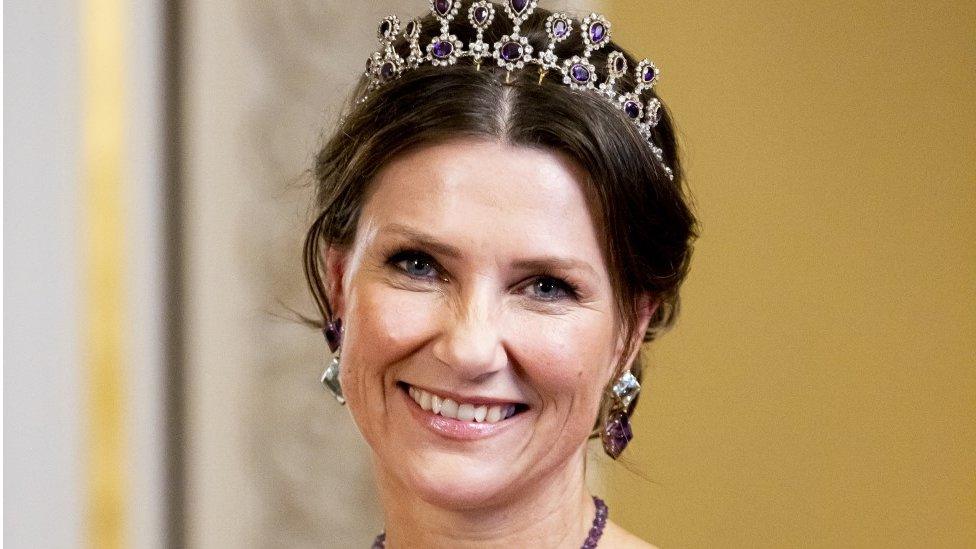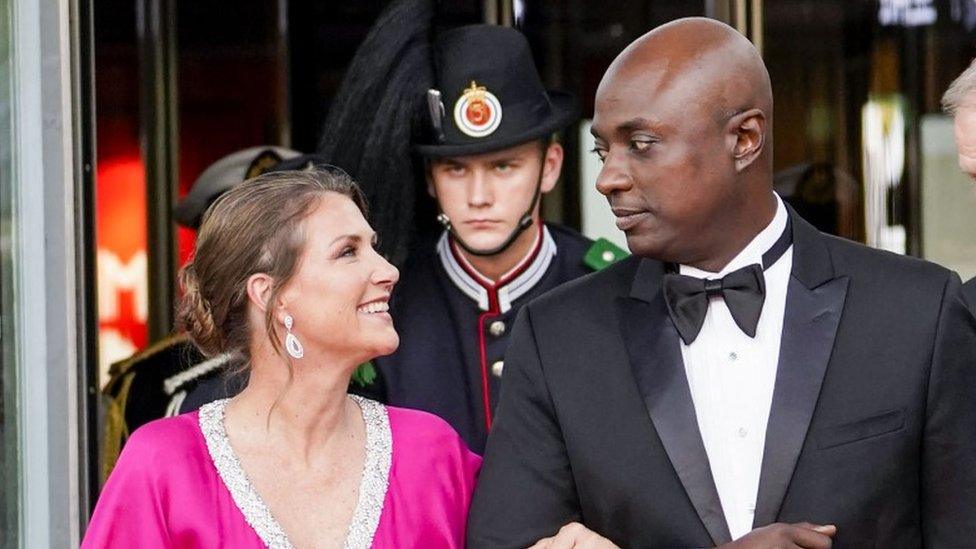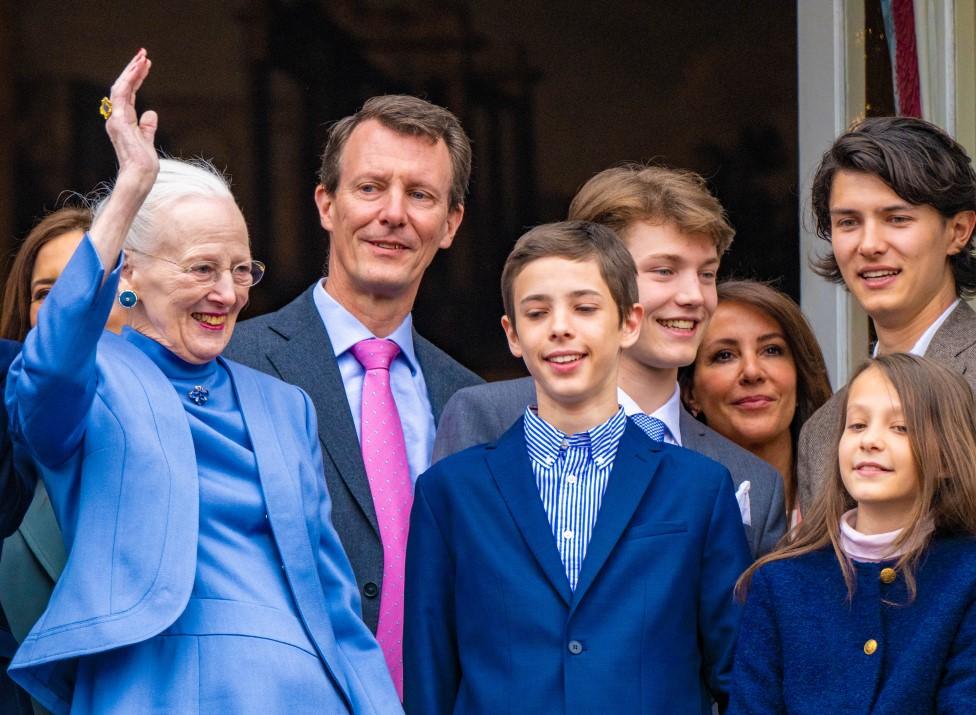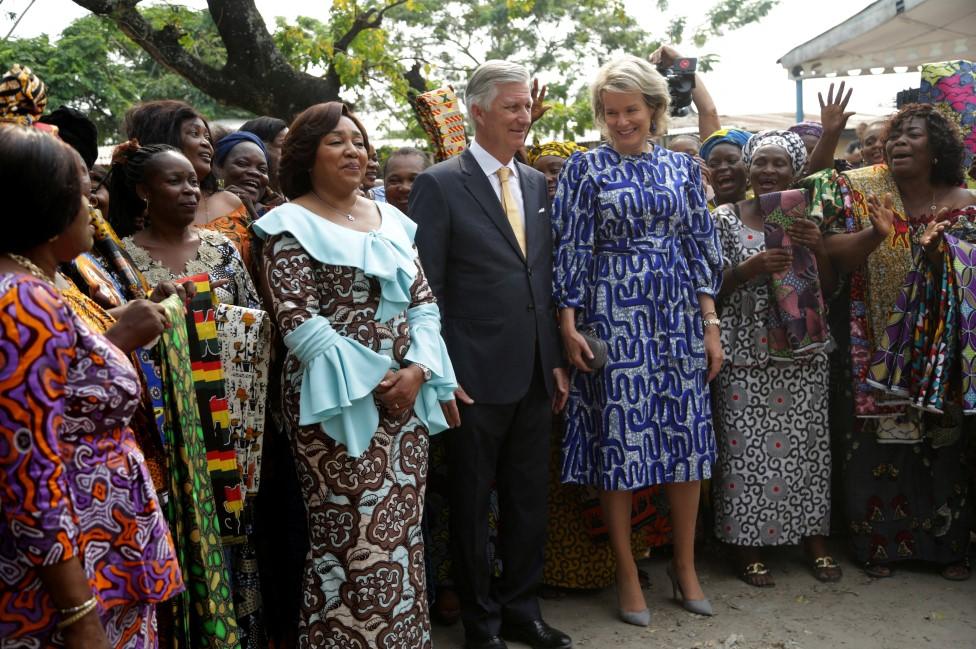What Europe's royals could teach King Charles
- Published

Norway's Princess Martha Louise
As he begins his reign, King Charles III has a lot on his royal platter - a combative media, a colonial past and rebellious children. Can other royal families in Europe offer any solutions?
Even kings need a little help.
If Charles III was running a business, he'd turn to a leadership coach - or perhaps a therapist. But being a king isn't like being a CEO; there aren't many self-help books on nailing a successful royal reign.
Fortunately, there are people the King can look to for ideas. Across the English Channel there are a dozen European royal families, many related to him, who understand his unique challenges.
So, offered in the spirit of friendly advice, here are some royal lessons from abroad.
From Norway - how to soothe family tensions
King Charles' son, Prince Harry, as all the world knows, has stepped back from royal duties and retreated to California, where he has not held back from angry public criticism of the British Royal Family, including his father. It's a sad, very public family drama.
Norway's royal family has its own rebellious spare - the child not destined to rule - but they have dealt with the situation in a very different way.
Princess Martha Louise is the oldest daughter of King Harald V and Queen Sonja - because Norway's surprisingly unprogressive royal succession laws were only changed when the princess was a teenager, her younger brother will inherit the throne. But she's a fascinating, and controversial, character in her own right.
Martha Louise talks to angels. A few years ago she set up a school where, for a fee, she taught other people how to "get in contact with the angels" too. Norway's press quickly dubbed it the "angel school". Her fiance is an American - a shaman with a large social media following and a side business selling $200 "spirit optimizer" medallions, which he suggests helped cure him from Covid. It's not regular royal fare.
Watch: Martha Louise tells BBC what ultimately made her quit
"There's been so much turmoil with me, you know, taking a different path than being a traditional royal, there's been a lot of criticism over the years," she said, during a day we spent together in Trondheim, Norway, where she was hosting a spiritual event.
Amid complaints that she was using her royal title to make money from these businesses, she too stepped back from royal duties in 2022. She now describes herself as a serial entrepreneur.
But there's an important difference in how the Royal House of Norway and the Royal House of Windsor have dealt with these complicated family dynamics. Martha Louise's activities, and royal demotion, haven't caused a rift in the family.

Find out more
Watch Katty Kay's documentary Europe's Royals Revealed on BBC iPlayer (UK Only) or on BBC Select, in the US and Canada, external

"What has been amazing through this whole cycle has been the conversations we've all had through it all," she says.
Her account of the genuine affection within the family is backed up by Caroline Vagle, royal reporter at SE og HØR (See and Hear) a tabloid magazine, which often features Martha Louise and Shaman Durek on its front pages.
"The king said it's a culture conflict and put out a statement that the family are stronger together after the discussions," recalls Vagle. "I think the king is a diplomat and everyone could say what they mean and maybe they agree to disagree."

Princess Martha Louise with fiance Durek Verrett
The key to the Norwegian royal family's ability to handle the unhappy spare without a hurtful rift has been pretty simple, says Vagle. "They love each other. It's a good family relationship."
And, critically, when they say they love each other, Norwegians believe them.
From Denmark - how to deal with a pushy media
The Scandinavian press is a far cry from the British tabloids.
At SE og HØR, royal controversies only get in the paper if they are deemed to be in the national interest. Further south, in Denmark, the royal family has an even smoother relationship with the national media and it came in handy when they had a family crisis.
Last year Queen Margrethe II of Denmark announced that she was cutting four of her eight grandchildren from the royal payroll and stripping them of their royal titles of prince and princess. It was all part of a bid to slim down the royal household and cut expenses - something King Charles also wants to do.

Queen Margrethe on her birthday with son Joachim and grandchildren
The grandchildren's father, Prince Joachim, the Queen's youngest son, reportedly only heard the news from a courtier. That hurt. And when a Danish reporter questioned him in public on the streets of Paris one day, he didn't hold back, saying his children had been mistreated.
"That really rocked the boat because it was the first time ever that the members of the royal family would speak out about things they didn't agree with," Tine Gotzsche, who reported on the palace for two decades, explained. An unspoken protocol was broken.
The question was whether Prince Joachim's outburst would threaten the Danish royal family's stellar approval ratings.
The fact it didn't is in part because the public agreed with the economy measures and in part because Queen Margrethe herself deployed an unlikely weapon - humility. She released a statement saying she stood by the decision but had underestimated the extent to which her son and his family felt about it. "That makes a big impression, and for that I am sorry."
The statement made headlines, went a long way to defusing the crisis and helped the royals stay relevant.
But something had shifted in the relationship between palace and press. Reporters learned they could shout out questions to royals and they may get answers. Meanwhile the royal family learned it needed to operate in a more modern media environment. In Denmark, perhaps in the UK too, that calls for a healthy dose of humility and emotional intelligence.


Read the latest from our royal correspondent Sean Coughlan - sign up here.

From Belgium - what to say about the colonial past
A month before his coronation, King Charles let it be known that he supports research into the British monarchy's historic links with slavery. It caps a troubled period for the Royal Family, amid growing demands for recognition of the harm caused by Britain's imperial past. It is a stain other European royals have also been forced to confront.
The Black Lives Matter protests that swept the world after the death of George Floyd in 2020 were particularly potent in Belgium, where the country's record of extreme brutality in the Democratic Republic of Congo under King Leopold II was put under a spotlight.
The current King of Belgium, Philippe, recently issued a letter of regret for his ancestor's past. But it was not an apology. And for one member of the royal household the king didn't go far enough.

King Philippe with wife Mathilde in Democratic Republic of Congo
Philippe's aunt, Princess Marie-Esmerelda, is far more outspoken. "We have to face the past, especially when we see that racism is really structural in our societies and that comes directly from slavery, from colonialism. So we have to face that," the princess told the BBC.
"As a member of the royal family, because my great-great-uncle was ruler at the time, I think it's important to talk about it. It's a responsibility."
Marie-Esmerelda can be more direct than the king because she is outside the line of succession. In constitutional monarchies, the monarch isn't expected to express their personal political views in public.
Philippe went further than his predecessors, which suggests the Belgian government has also shifted. But it is not yet ready for an actual apology for the murder of millions of Congolese.
It's a fine linguistic, and legal, line King Charles will be walking too.

